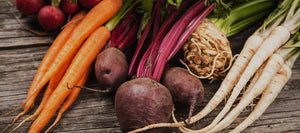We’ve compiled a list of the best reasons we could think of, consulted the web and asked you why you’ve gone organic. Here are the results:
- Organic Food Tastes Better – It’s that simple! Food that’s grown in nutritious organic soil without chemicals has a fuller, more flavourful taste.
- No Hormones – Non organic livestock are often pumped full of growth hormones that humans end up consuming. These hormones can have negative effects on our health.
- No Chemical Pesticides – Chemical pesticides that are used in non-organic farming contain pesticides that are known to be harmful to human health!
- No Neurotoxins – Certain insecticides used in food production referred to as “neonicotinoids” have potentially neurotoxic effects on the human nervous system.
- Helps Keep Drinking Water Pesticide Free – Pesticides from food production inevitably ends up in our drinking water.
- No Antibiotics – We are consuming more harmful antibiotics than ever before as they are being widely used in conventional farming.
- No Unnatural Additives in Animal Feed – Non-organic livestock are typically fed with GMO cord and Soybean meal, but are also fed with manure, non food additives like sawdust, and animal by-products.
- No Sewage Sludge – Sewage sludge is human waste and other waste matter that is used to fertilize crops. The dangers from contamination of sewage sludge arises from prescription medications like mood altering drugs, chemicals and other pathogens whose effects and dangers aren’t fully understood.
- No GMO Produce – Organic produce is grown with non-GMO seeds.
- Less Bacteria Than Non-Organic – Organic food and livestock have less harmful bacteria like E-coli & Salmonella.
- Supports Sustainable Farming – Organic farmers use techniques that support environmental health, profitability, and social equity.
- No Gas Ripening of Produce – Harmful gases like calcium carbide are used to accelerate the ripening of fruit and have harmful effects on humans due in part to trace amount of arsenic and phosphorus.
- No Carcinogens – Many pesticides used in non-organic farming are known carcinogens, which means that they are known to cause cancer.
- Healthier for Children – The developing bodies or children are much more susceptible to the toxic effects of pesticides and chemicals.
- You Are What You Eat – Our cells are literally made from the food we eat. Make sure your body is chemical free.
- No Irradiation – Irradiation is the process of applying radiation to various crops to kill bacteria or reduce the likelihood of insect contamination.
- Biodiversity – Organic farms have greater biodiversity due to practices like manure fertilization, crop rotation, and multi-cultural crops.
- More Ethical for Farm Animals – Organic farmers provide farm animals with natural living conditions, allowing them to graze, nest and have fuller lives.
- Health & Wellbeing of Farmers – Farmers are negatively affected by the chemicals used in pesticides
- Knowing Where Your Food Comes From – Organic foods are generally grown closer to home, and you have the peace of mind knowing that your food adheres to strict organic standards.
- Saves Energy – The energy used to create and transport synthetic fertilizers is enormous.
- Prevents Soil Erosion – Organic farmers work on building healthy soil
- Stops The Spread of Mad Cow Disease – Organic farming prohibit feeding livestock animal by-products, which is one of the ways that Mad Cow Disease is spread.
- Support Small Farmers – While non-organic farming is being taken over by factory farms, organic farms are typically smaller, independently owned operations that supports farmer livelihoods.
What is Organic Farming & Why is it Important?
Organic farming refers to more than the absence of chemicals and antibiotics in the cultivation of crops. Certified organic farmers do not use any of the following in the production of their produce:
- GMOs
- Synthetic pesticides
- Growth Hormones
- Herbicides or fungicides
- Irradiation
- Chemical fertilizers
- Sewage sludge
- Antibiotics
Organic production is based on the principals of sustainability, and work in harmony with the environment by maintaining diversity, soil fertility, renewable resources, and recycling.
Non-Organic Produce
According to the most recent Ontario Ministry of Agriculture and Food survey, 532.8 tons of pesticides were used in the production of fruit, and 337.6 tons of pesticides were used to grow vegetables in 2008. That’s a lot of chemicals! Moreover, non-organic produce & livestock are subject to a number of other harmful agents like antibiotics, sewage sludge, GMO’s and more.
There is an added cost to buying organic, but it is a small price to pay for the incredible nutritional benefits of organic produce, as well as the absence of so many chemicals.
Why is eating organic important to you?
Join the conversation! Join us on Facebook or Twitter.
Resources: Ontario Ministry of Agriculture, Food, and Rural Affairs, Organic Consumers Association, Getting Started With Healthy Eating
